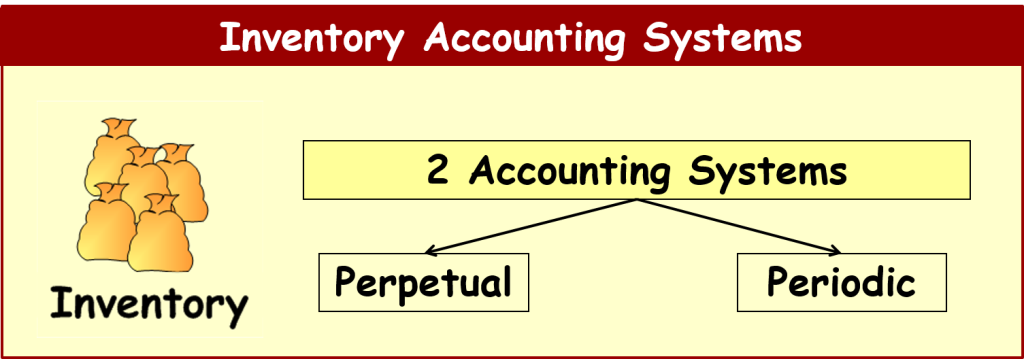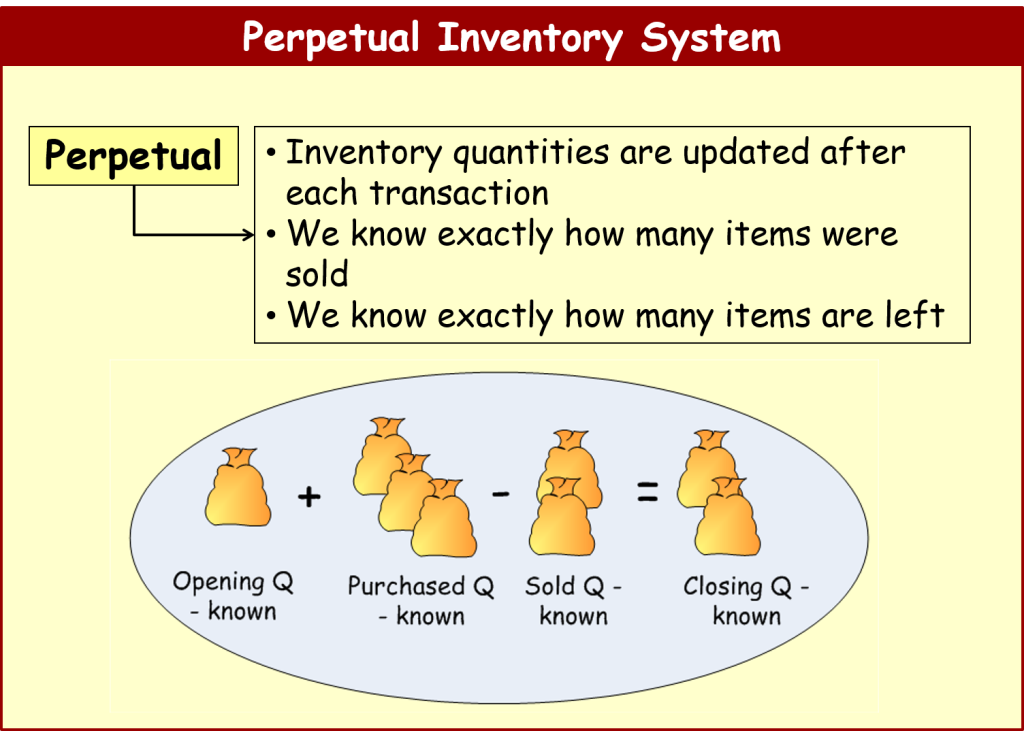Referring to the earlier topic, which covered what is inventory, the essential question is how to correctly manage inventory, track and calculate cost of inventory sold and cost of inventory, which remains at the end of the accounting period for further sales.
For this purpose two inventory management systems can be used:
- perpetual inventory system
- periodic inventory system

What is Perpetual Inventory System?
 Under Perpetual Inventory System changes in Inventory are tracked continuously. Inventory account is updated after each transactions, either purchase, or sale.
Under Perpetual Inventory System changes in Inventory are tracked continuously. Inventory account is updated after each transactions, either purchase, or sale.
- Perpetual inventory management system allows to know at each moment of time, how many items were sold and how many items are left in inventory
- This is precise system, which allows to control all inventory movements

 Explore further Periodic Inventory System
Explore further Periodic Inventory System
The Most Popular Accounting & Finance Topics:
- Balance Sheet
- Balance Sheet Example
- Classified Balance Sheet
- Balance Sheet Template
- Income Statement
- Income Statement Example
- Multi Step Income Statement
- Income Statement Format
- Common Size Income Statement
- Income Statement Template
- Cash Flow Statement
- Cash Flow Statement Example
- Cash Flow Statement Template
- Discounted Cash Flow
- Free Cash Flow
- Accounting Equation
- Accounting Cycle
- Accounting Principles
- Retained Earnings Statement
- Retained Earnings
- Retained Earnings Formula
- Financial Analysis
- Current Ratio Formula
- Acid Test Ratio Formula
- Cash Ratio Formula
- Debt to Income Ratio
- Debt to Equity Ratio
- Debt Ratio
- Asset Turnover Ratio
- Inventory Turnover Ratio
- Mortgage Calculator
- Mortgage Rates
- Reverse Mortgage
- Mortgage Amortization Calculator
- Gross Revenue
- Semi Monthly Meaning
- Financial Statements
- Petty Cash
- General Ledger
- Allocation Definition
- Accounts Receivable
- Impairment
- Going Concern
- Trial Balance
- Accounts Payable
- Pro Forma Meaning
- FIFO
- LIFO
- Cost of Goods Sold
- How to void a check?
- Voided Check
- Depreciation
- Face Value
- Contribution Margin Ratio
- YTD Meaning
- Accrual Accounting
- What is Gross Income?
- Net Income
- What is accounting?
- Quick Ratio
- What is an invoice?
- Prudent Definition
- Prudence Definition
- Double Entry Accounting
- Gross Profit
- Gross Profit Formula
- What is an asset?
- Gross Margin Formula
- Gross Margin
- Disbursement
- Reconciliation Definition
- Deferred Revenue
- Leverage Ratio
- Collateral Definition
- Work in Progress
- EBIT Meaning
- FOB Meaning
- Return on Assets – ROA Formula
- Marginal Cost Formula
- Marginal Revenue Formula
- Proceeds
- In Transit Meaning
- Inherent Definition
- FOB Shipping Point
- WACC Formula
- What is a Guarantor?
- Tangible Meaning
- Profit and Loss Statement Template
- Revenue Vs Profit
- FTE Meaning
- Cash Book
- Accrued Income
- Bearer Bonds
- Credit Note Meaning
- EBITA meaning
- Fictitious Assets
- Preference Shares
- Wear and Tear Meaning
- Cancelled Cheque
- Cost Sheet Format
- Provision Definition
- EBITDA Meaning
- Covenant Definition
- FICA Meaning
- Ledger Definition
- Allowance for Doubtful Accounts
- T Account / T Accounts
- Contra Account
- NOPAT Formula
- Monetary Value
- Salvage Value
- Times Interest Earned Ratio
- Intermediate Accounting
- Mortgage Rate Chart
- Opportunity Cost
- Total Asset Turnover
- Sunk Cost
- Housing Interest Rates Chart
- Additional Paid In Capital
- Obsolescence
- What is Revenue?
- What Does Per Diem Mean?
- Unearned Revenue
- Accrued Expenses
- Earnings Per Share
- Consignee
- Accumulated Depreciation
- Leashold Improvements
- Operating Margin
- Notes Payable
- Current Assets
- Liabilities
- Controller Job Description
- Define Leverage
- Journal Entry
- Productivity Definition
- Capital Expenditures
- Check Register
- What is Liquidity?
- Variable Cost
- Variable Expenses
- Cash Receipts
- Gross Profit Ratio
- Net Sales
- Return on Sales
- Fixed Expenses
- Straight Line Depreciation
- Working Capital Ratio
- Fixed Cost
- Contingent Liabilities
- Marketable Securities
- Remittance Advice
- Extrapolation Definition
- Gross Sales
- Days Sales Oustanding
- Residual Value
- Accrued Interest
- Fixed Charge Coverage Ratio
- Prime Cost
- Perpetual Inventory System
- Vouching
Return from Perpetual Inventory System to AccountingCorner.org